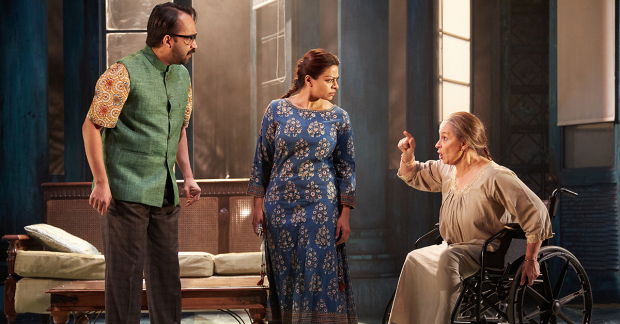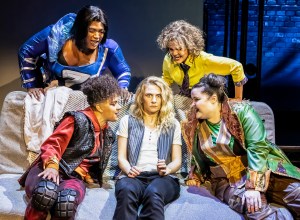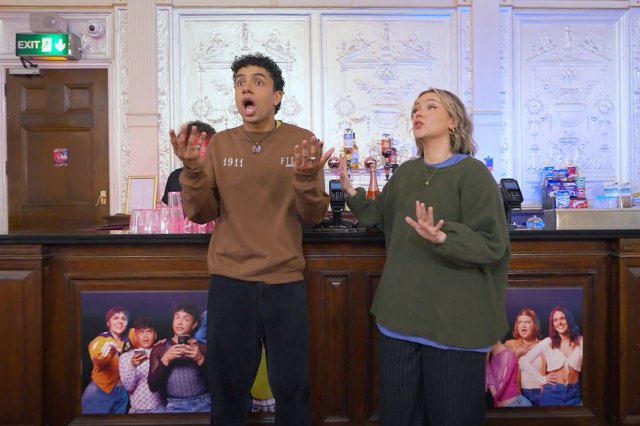Review: When the Crows Visit (Kiln Theatre)
Anupama Chandrasekhar’s world premiere explores themes from Ibsen’s ”Ghosts” this autumn

© Mark Douet
Misogyny, toxic masculinity at its most extreme and the perpetuation of evil by allegedly good people standing by and not resisting, are at the forefront of Anupama Chandrasekhar's gripping but undisciplined new play. Inspired partly by the "sins of the fathers" theme of Ibsen's Ghosts and a horrific real-life gang rape that took place in Delhi in 2012, this is bold, button-pushing stuff, dripping with heavy-handed symbolism and compulsive theatricality.
As the lights come up on the decaying Chennai mansion set, bed-ridden matriarch Jaya, and a cacophony of beating crows wings (excellent sound work throughout by Ben and Max Ringham) it looks initially as though we might be in for an elegiac family drama. That illusion is shattered almost immediately by the arrival of two decidedly modern women: Jaya's acerbic young nurse and vinegary, widowed daughter-in-law, Hema. The trio trade insults and put-downs before the scene gives way to the pumping dance music of a trendy Mumbai bar frequented by golden boy family son Akshay and his upwardly mobile work colleagues. It becomes clear pretty quickly that Akshay has what might be termed anger management issues, at the very least. Hang on though, because you ain't seen nothing yet.
While it's refreshing to see a stage depiction of modern, urban Indian lifestyles, the play has darker, more important things on its mind, and that is where both its interest, and a fair few of its problems, lie. As Akshay is implicated in the brutal rape of a waitress from the Mumbai bar, we learn unpalatable truths about Hema's relationship with his late, abusive father and the lamentable willingness of the family women to turn blind eyes to unacceptable behaviour from their menfolk. Although Chandrasekhar's dialogue is tartly amusing, it's unable to deflect attention from the sketchiness of the characterisations and the eye-rolling unlikeliness of some plot developments as the piece draws melodramatically on.
Indhu Rubasingham's overwrought but visually gorgeous production starts at fever pitch and seldom takes its foot off the emotional pedal. It makes for an exhausting, if never boring, couple of hours, albeit with much to enjoy: Richard Kent's strikingly beautiful set is atmospherically lit by Oliver Fenwick, there is eerily ingenious shadow puppetry (for the crows) by Matt Hutchinson, and Ayesha Dharker does fine, detailed, emotionally intelligent work as conflicted Hema. She is ably supported by Soni Razdan as her garrulous, storytelling mother-in-law and Mariam Haque, doubling nicely as her free-spirited sister and as Akshay's uptight colleague.
The men don't fare so well: Asif Khan is unsubtle and excessively mannered as a corrupt cop and, in the key role of troubled, spoilt Akshay, Bally Gill ricochets wearyingly between cocky and shouty. Admittedly, he isn't helped by being saddled with a character who, as written, has no redeeming features whatsoever and whose increasingly outrageous and nasty behaviour beggars belief. There's an underdeveloped, if hardly original, idea that Akshay's cruelty and potential criminality is the result of exposure to excessively violent video games, but that never reaches any satisfactory conclusion. These are flaws in a play that, for all its good intentions, starts to feel uncomfortably sensationalist and exploitative as it represents some of the appalling treatment meted out to women in a patriarchal society.
Dharker impressively charts Hema's journey from adoration of her only offspring to a furious, bitter acceptance of the family tragedy she has unwittingly helped to write. She is the dramatic and emotional glue that holds the entire show together, and makes one long to see her have a stab at Mrs Alving, Ibsen's equivalent to Hema in the original Ghosts. For the rest, it's a wildly uneven evening, but one with an unquestionable fire in its belly and its heart in the right place.






















